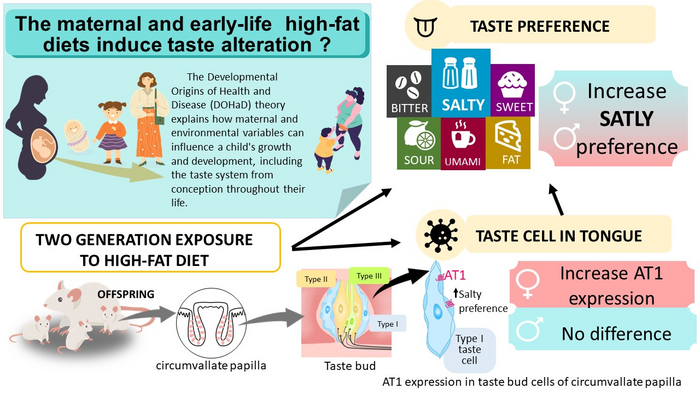None of it is science. The only thing to keep in mind, when presented with 'X is a risk factor for' claims, is 'do your best.' Coffee, don't go crazy, alcohol, don't go crazy. Don't smoke anything. Don't eat foods that may have bacteria that can cross the placental barrier, like listeria.(1) New mothers are ground zero in financially-motivated atomic bombs of disinformation and misinformation so use your instincts. If it sounds like shady health epidemiology, from the same people who told us butter was bad and to replace it with trans fats, it probably is.
Using some critical thinking is why you should not rush to blame your mother if you are fat. A new paper suggests that her eating high-fat foods may be why you like high-calorie salty foods. Your Doritos fetish is not exculpatory, neither your epigenetics nor your microbiome nor mysterious addictive chemicals FDA can't find are not the reason you eat the whole bag. You are.

Developmental Origins of Health and Disease (DOHaD) proponents claim that determinism rules. Your early exposures determine your life, but since it include microbiome and epigenetic claims mixed in with epidemiology, there is no science to it.
Unless you are a rat. But 'in rats' is why this paper, and all animal models, are exploratory. They have no human relevance. Rats are not little people.
Still, they can be interesting and sometimes even have value. Scientists didn't do human clinical trials of smoking or even methylene chloride to know they were bad for humans. Data were clear. The big win for epidemiology, that smoking causes cancer - not just linked - led to a gigantic Big Tobacco settlement in the 1990s, and tens of billions of dollars being handed out set off a chain of epidemiologists and animal researchers wanting to find 'the next smoking.' Today, International Agency for Research on Cancer (IARC), once a respected voice in epidemiology, is competing with Ramazzini Institute (never respected) and National Institute of Environmental Health Sciences (sketchy starting in the 2009) to link every chemical to cancer.(2)
So with that 400 words of qualifiers you never get from press releases here is the story on rats and high-fat diets. The researchers gave pregnant and lactating rats a high-fat diet while a control group got normal chow. Offspring continued the same diets. High-fat diet rats ate more and got fatter. This makes sense. Humans have genetically engineered food for the last 12,000 years to have higher caloric density and modern science and technology has spread affordable food to the world.(3)
There would be no story to tell if that were the extent of it but the researchers used a two-bottle test - one plain water and one with flavor - to see how the offspring responded to bitter, salty, sour, sweet, and umami tastes, and found that pups fed a high-fat diet preferred salty water, but none of the others.
That's interesting. The authors throw in that the mothers also had high-fat foods but it could be a meaningless correlation, since all of the pups were fed the same diet as their mothers. However, they found that AT1 expression - which has been linked by some to a preference for saltier taste - was higher in female offspring fed high-fat diets.
So maybe only women can blame their mothers for why they eat the whole bag of Totino's pizza rolls. But don't blame anyone except yourself just yet. These are still rats, not people.
NOTES:
(1) Absolutely don't buy into political epidemiology like that a Republican winning an election causes more pre-term births, that the pizza box your meal arrived in makes you fatter than eating the pizza, or that conventional pesticides cause autism but organic ones don't - only because none of the epidemiologists chose to look at organic pesticides.
(2) The only time IARC ever changed their minds was after a string of controversies related to Working Group members signing lucrative expert witness contracts before the 'results' were published. They rushed to deflect criticism that 'everything causes cancer' by reducing the cancer categorization for coffee.
(3) To the dismay of environmentalists and eugenicists of the last century. Instead of mass starvation of the past, we now have to worry about obesity-related diseases. That's actually a good thing.




Comments